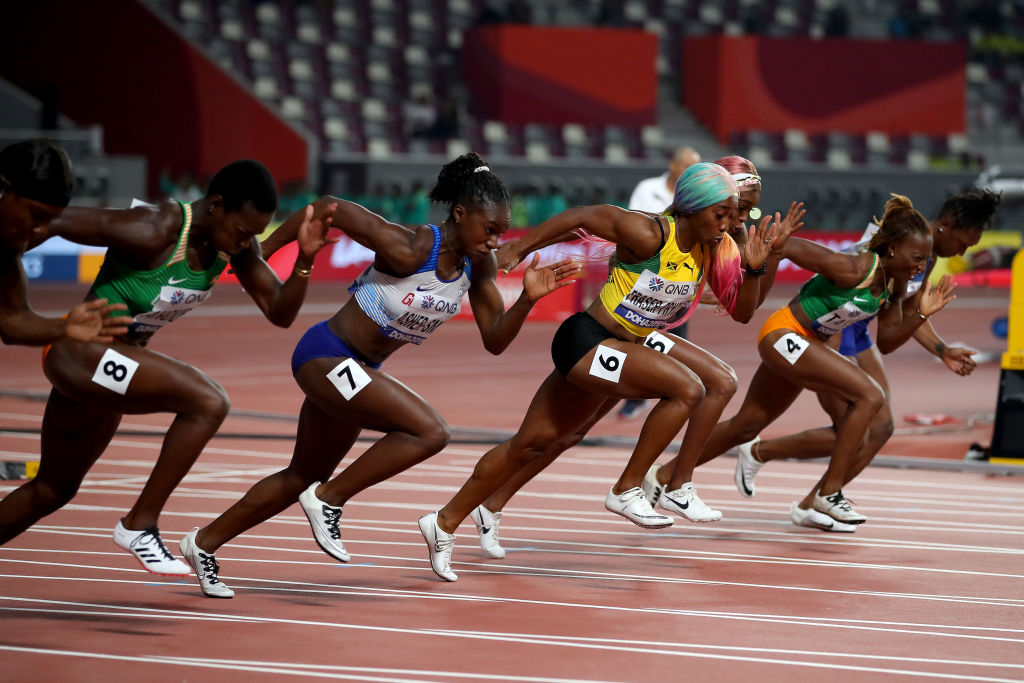Women's 100m Final: A Comprehensive Guide To The Race Of Champions
The Women's 100m final is one of the most anticipated events in athletics, showcasing the speed and agility of the world's fastest female sprinters. Every four years, the eyes of the world turn to this electrifying race, where athletes from various nations compete for glory on the global stage. This event not only highlights individual talent but also reflects the growing prominence of women's athletics in sports history.
In this article, we will delve into the history, significance, and latest developments surrounding the Women's 100m final. Our aim is to provide you with an in-depth understanding of this exhilarating event, ensuring that you are well-informed about the athletes, statistics, and records that define it.
Whether you are a fan of track and field, an aspiring athlete, or someone seeking to learn more about this exciting sport, this comprehensive guide will equip you with valuable insights. So, let's sprint ahead and explore the fascinating world of the Women's 100m final!
Table of Contents
- History of the Women's 100m Final
- Significance of the Event
- Notable Athletes in Women's 100m
- Current Records and Statistics
- Recent Competitions and Highlights
- Future Prospects for Women in Athletics
- Training Tips for Aspiring Sprinters
- Conclusion
History of the Women's 100m Final
The Women's 100m final has a rich history that dates back to the early 20th century. The event was first introduced in the 1928 Amsterdam Olympics, marking a pivotal moment in women's sports. Initially, the race was met with skepticism, but as women began to excel, it gained recognition and respect.
Over the decades, the competition has evolved, with significant milestones such as the first world record set by American sprinter Helen Stephens in 1936. The event has continued to grow, with new athletes emerging and pushing the boundaries of speed and performance.
Key Milestones in Women's 100m History
- 1928: First Olympic Women's 100m final held.
- 1960: Wilma Rudolph becomes the first American woman to win three gold medals in a single Olympics.
- 1988: Florence Griffith-Joyner sets a world record of 10.49 seconds at the Seoul Olympics.
- 2008: Usain Bolt's dominance draws attention to the women's event as well.
Significance of the Event
The Women's 100m final is not just a race; it symbolizes empowerment and the breaking of barriers in sports. It showcases the incredible talent of female athletes who have fought for equality and recognition over the years.
This event serves as a platform for female athletes to demonstrate their skills and inspire future generations. It also plays a crucial role in promoting gender equality in sports, encouraging young girls to pursue their athletic dreams.
Notable Athletes in Women's 100m
Over the years, numerous athletes have left their mark on the Women's 100m final. Here are a few notable names:
- Florence Griffith-Joyner - Known for her incredible speed and distinctive style, she still holds the world record.
- Marion Jones - A former world champion whose legacy is marked by controversy.
- Elaine Thompson-Herah - The current Olympic champion with multiple accolades.
- Shelly-Ann Fraser-Pryce - A dominant force in women's sprinting with several world titles.
Current Records and Statistics
The current world record for the Women's 100m is 10.49 seconds, set by Florence Griffith-Joyner in 1988. This record has stood for decades, highlighting the incredible performance of athletes in this event.
Recent Record Holders
- World Record: 10.49 seconds - Florence Griffith-Joyner (1988)
- Olympic Record: 10.61 seconds - Elaine Thompson-Herah (2021)
- Personal Bests: Various athletes continue to break personal records annually.
Recent Competitions and Highlights
In recent years, the Women's 100m final has seen thrilling competitions, particularly during the Olympic Games and World Championships. The 2021 Tokyo Olympics showcased an electrifying race, with Elaine Thompson-Herah defending her title.
Highlights from the Tokyo 2021 Olympics
- Elaine Thompson-Herah won gold with a time of 10.61 seconds.
- Jamaica dominated the podium with two other sprinters finishing strong.
- The race received global media coverage, emphasizing the growing popularity of women's athletics.
Future Prospects for Women in Athletics
The future looks bright for women's athletics, particularly in the 100m final. With increasing support and visibility, more young women are encouraged to pursue sprinting.
As we look ahead, we can expect to see new records being set, as well as more female athletes breaking into the elite ranks of sprinting. The continued investment in women's sports will only enhance the quality of competition.
Training Tips for Aspiring Sprinters
If you are an aspiring sprinter looking to excel in the Women's 100m final, consider the following training tips:
- Focus on Speed Work: Incorporate sprint drills and interval training to improve your speed.
- Strength Training: Build muscle strength through weight training to enhance your power.
- Flexibility: Engage in stretching and mobility exercises to prevent injury and improve range of motion.
- Nutrition: Maintain a balanced diet to fuel your body for optimal performance.
Conclusion
In conclusion, the Women's 100m final is a thrilling event that celebrates the speed, strength, and resilience of female athletes. With a rich history, significant impact on gender equality, and incredible performances, it continues to captivate audiences worldwide.
We invite you to share your thoughts in the comments below, explore more articles on our site, and stay updated on the latest developments in women's athletics!
Sources
For further reading and reliable statistics, you can refer to the following sources:
- IAAF - International Association of Athletics Federations
- Olympic.org - Official Olympic Website
- World Athletics - Official Athletics Organization
Article Recommendations
- Cast Of Oppenheimer
- Onur Tuna Wife
- Legendary Actress Lorraine Bracco Exploring Her Career And Impact

